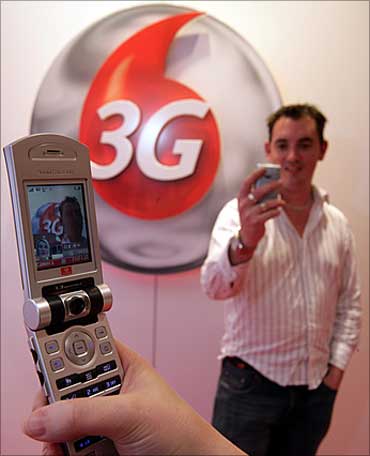
Analysts feel that mobile number portability may trigger the next price war amongst telecom operators that would eventually benefit the end customer.
Earlier, the government had postponed the implementation of MNP to October 31 as the operators were not ready with the infrastructure to provide the service.
MNP is a service that enables mobile telephone users to retain their mobile telephone numbers when changing from one mobile network operator to another.
This was for the third time that the implementation of MNP was postponed in India.
According to telecom ministry statement, 'the government has taken the decision after reviewing the readiness of the various accesses, international long distance service providers and keeping in view the complexity and enormity of the testing involved before MNP is implemented.'
. . .

MNP reduces the barrier for people to move from one network to another, thus leveling the playing field for new entries into the mobile phone network service provider industry.
"The change is expected to increase competition.
"However after an initial churn, there will not be significant shifts by subscribers from one operator to another," analysts said.
The telecom industry has gone through a sea change with respect to pricing after the introduction of a plethora of players over the last one year or so.
Analysts believe what has been served is just a preview to the real war.
"The gloves are really off with the introduction of mobile number portability. All this while operators could sit back and relax once they acquired a new customer.
. . .

"They had the advantage of an inherent barrier as customers were reluctant to switch between networks due to the effort of recreating their social network on their new numbers", said Arun Singh Shekhawat, vice president of the public interest portal called ChangeMyNetwork.com.
While mobile number portability has existed in countries such as the United Kingdom, Germany, Hong Kong and the Unites States since the turn of this century, it has been introduced more recently in other South East Asian countries such as Singapore and Taiwan. It was also introduced in Pakistan in 2007.
Some of the factors that determine the success of MNP in a country are the penetration of mobiles, the number of mobile network operators operating in a zone, the time taken for a number port and the cost that is charged onto a customer for a number port.
According to a survey done by Frost and Sullivan, MNP has worked well in South Korea and Hong Kong and has proven ineffective in Taiwan, Singapore and Japan.
. . .

| Country | Porting charges | %age of mobile penetration during MNP implementation | Time taken for porting |
|
| $0.38 |
|
|
| Singapore | $0-$13.37 | 15.7% | 7 days |
| Taiwan | $14.31 -$42.92 | 91.7% | N.A |
| Japan | $0-$25.00 | 60.0% | N.A |
| Australia | $5.59 | 61.0% | 3hrs 3 days |
| South Korea | N.A | 70.1% | N.A |
Source: Frost and Sullivan, Key Note Capitals Research
The reason for failure in Singapore was because of the low mobile penetration at the time of implementation.
. . .

In some developed markets such as Japan and Taiwan the service providers often tied down their subscribers in long-term service contracts that range from 12 to 24 months.
In return, service providers subsidised or provided free mobile handsets.
Mobile phone subscribers had to wait until their contract expired, or pay a penalty for breaking their contract if they insisted to switch.
This became a huge dampener for customers to avail of the MNP facility in Taiwan and Japan.
Research findings point out that the most appropriate time to introduce MNP services is when the mobile penetration is high and new service providers are entering into the market.
. . .

All these conditions seem to be making it a perfect storm for the portability service to be availed in India.
MNP will not only intensify the ongoing tariff-cuts among the service providers but also bring improved quality of service and other innovative products and offerings.
Shekhawat added that there have been a lot of reports that suggesting that mobile number portability is an urban, post-paid concept.
"To the contrary, in India, I wouldn't b e surprised if it's just the opposite. It is a fallacy to expect only metros and post-paid customers to use number portability."
(The data and statistical inputs in this article are from Yudofud Public Strategies)